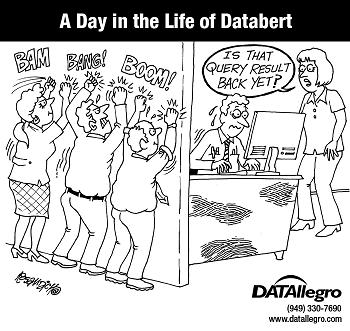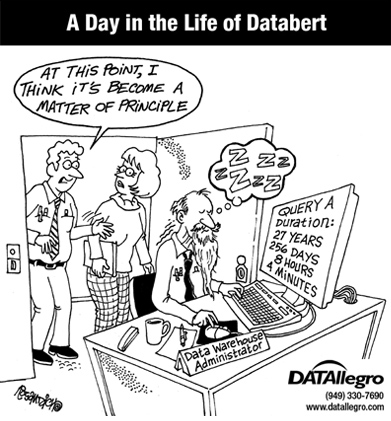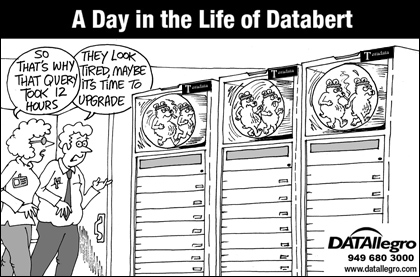Data warehousing
Analysis of issues in data warehousing, with extensive coverage of database management systems and data warehouse appliances that are optimized to query large volumes of data. Related subjects include:
Further thoughts on DATAllegro/Microsoft
My first, biggest thought about DATAllegro’s acquisition by Microsoft is “Why the ____ did it have to happen while I was trying to relax on my annual Cayman vacation???” Not coincidentally, I don’t plan to neatly cross-link all my posts and so on about DATAllegro/Microsoft until I get back to Acton this weekend.
One linking screwup is that I previously forgot to mention that — in addition to the numerous posts here — I also made several DATAllegro/Microsoft-related posts on my Network World blog A World of Bytes. They include: Read more
| Categories: Analytic technologies, Data warehousing, DATAllegro, Microsoft and SQL*Server | 8 Comments |
Other early coverage of Microsoft/DATAllegro
- Here’s the official press release on DATAllegro’s site, and Microsoft’s.
- Doug Henschen of Intelligent Enterprise has a good article. He got quotes from Microsoft claiming that SQL Server on its own would be able to handle 10s of terabytes of data in the next release, but DATAllegro was needed to get up to the 100s of terabytes. That said, the quotes don’t say whether that’s user data or total disk usage — the latter frankly seems more plausible.
- James Kobielus of Forrester has a long post on the Microsoft/DATAllegro deal, emphasizing product packaging issues and glossing over technological differentiators. (Edit: The post seems down as of Friday midday.)
- This is a few weeks old, but Kevin Closson is extremely skeptical of some of DATAllegro’s technical claims. (Not that it matters much if he’s right — more nodes = more throughput, no matter how much Oracle folks rant.)
- Eric Lai of Computerworld gets it right.
- Larry Dignan thinks the acquisition is part of an overall strong Microsoft enterprise push.
- William McKnight thinks Microsoft usually does a good job of integrating acquisitions.
- DATAllegro CEO Stuart Frost is happy.
- David Hunter thinks Microsoft will blithely continue with DATAllegro’s limited-hardware-support strategy. He’s almost certainly wrong.
- Philip Howard says almost nothing I agree with, although I can’t argue with the part
Conversely, it’s bad news for Ingres, bad news for Oracle, bad news for IBM, bad news for Teradata and bad news for HP, all for obvious reasons. As for the other appliance vendors: they will not be too happy either. In particular, we now have to consider who can survive on their own, who might be acquired, who might do the acquiring, and who is going to disappear.
| Categories: Data warehousing, DATAllegro, Microsoft and SQL*Server | 15 Comments |
DATAllegro could provide Microsoft with a true enterprise data warehouse sooner than you think
Jim Ericson of DM Review emailed the excellent questions:
Does DATAllegro give MSFT full-service high end data warehousing capability? If not, what is missing?
My quick answers are:
- No.
- Two things:
- Hard-core multi-user concurrency.
- Support for more esoteric analytic tools and functionality
Both are largely a matter of product maturity, and as a young company DATAllegro isn’t quite there yet.
That said, integration with Microsoft SQL Server is apt to be a big help in addressing both issues. Read more
The data warehouse DBMS consolidation has begun
There are, or soon will be, a number of strong players in the market for data warehouse specialty DBMS.
- Teradata continues to prosper, whatever one may think of its price points.
- Netezza is growing healthily.
- Microsoft is buying DATAllegro.
- Oracle needs to buy somebody in response.
- DB2 is a significant player too, although perhaps not quite as big as one might think.
- Sybase IQ can’t be counted out either.
That doesn’t leave a lot of room for other players. Read more
| Categories: Data warehousing | 6 Comments |
How will Oracle save its data warehouse business?
By acquiring DATAllegro, Microsoft has seriously leapfrogged Oracle in data warehouse technology. All doubts about maturity and versatility notwithstanding, DATAllegro has a 10X or better size advantage (actually, I think it’s more like 20-40X) versus Oracle in warehouses its technology can straightforwardly handle. Oracle cannot afford to let this move go unanswered.
It’s of course possible that Oracle has been successfully developing comparable data warehouse technology internally. But it’s unlikely. Oracle hasn’t done anything that radical, internally and successfully, for about 15 years, RAC (Real Application Clusters) excepted. (I.e., since the object/relational extensibility framework started in Release 7.) So in all likelihood, the answer will come via acquisition. I think there are four candidates that make the most sense: Teradata, Vertica, ParAccel, and Greenplum. Kognitio (controlled by former Oracle honcho Geoff Squire) might be in the mix as well. Netezza is probably a non-starter because of its hardware-centric strategy.
Here’s why I’m emphasizing Teradata, Vertica, ParAccel, and Greenplum: Read more
| Categories: Analytic technologies, Data warehouse appliances, Data warehousing, DATAllegro, Greenplum, Microsoft and SQL*Server, Oracle, ParAccel, Teradata, Vertica Systems | 15 Comments |
Microsoft is buying DATAllegro
I’ve long argued that:
- Oracle and Microsoft are doomed in the data warehouse market unless they acquire MPP/shared-nothing data warehouse DBMS and/or data warehouse appliances.
- DATAllegro is the ideal acquisition for either of them.
Microsoft has now validated my claim by agreeing to buy DATAllegro. As you probably know, we’ve been covering DATAllegro extensively, as per the links listed below.
Basic deal highlights include: Read more
Long, confused overview of data warehouse DBMS vendors
Steven Swoyer has an article for Enterprise Systems that covers a lot of issues in data warehouse technology. Unfortunately, however, it doesn’t always cover them correctly. E.g., he seems to imply that columnar architectures aren’t relational. (Oops.) I wouldn’t put too much credence in the other market segmentations he posits either.
Some of his theses, however, are basically correct. E.g., he points out that demand for fast, cost-effective, (almost) unconstrained ad hoc queries keeps growing, and that much of the recent innovation is concerned with supplying them.
| Categories: Data warehousing | 1 Comment |
Declaration of Data Independence (humor)
The data warehouse appliance industry has a well-developed funny bone. Dataupia’s contribution is a Declaration of Data Independence, which begins:
When in the Course of an increasingly competitive global economy it becomes necessary for one data set to dissolve its connections to a constraining environment, the separate but inherently unequal station to which the Laws of Whose budget is larger prevails.
Related links:
- Cartoons from DATAllegro
- April Fool press release from Netezza
Three cartoons from DATAllegro



Related links:
- Humor from Netezza
- Another gerbil-based solution
| Categories: Analytic technologies, Data warehousing, DATAllegro, Humor | 1 Comment |
The IRS data warehouse
According to a recent Eric Lai Computerworld story and a 2006 Sybase.com success story,
- The IRS has a data warehouse running on Sybase IQ, with 500 named users, called the CDW (Compliance Data Warehouse). (Computerworld)
- By some metric, it’s a 150 TB warehouse. (Computerworld)
- By some metric, they add 15-20 TB/year, with a 4 hour load time. (Computerworld)
- As of 2006, there were 20-25 TB of “input data”, with a “70% compression rate”. (Sybase)
I can’t entirely reconcile those numbers, but in any case the database sounds plenty big.
Computerworld also said:
the research division also uses Microsoft Corp.’s SQL Server to store all of the metadata for the data warehouse and the rest of the agency. Managing and cleaning all of that metadata — 10,000 labels for 150 databases — is a huge task in itself,
| Categories: Analytic technologies, Data warehousing, Specific users, Sybase | 2 Comments |
